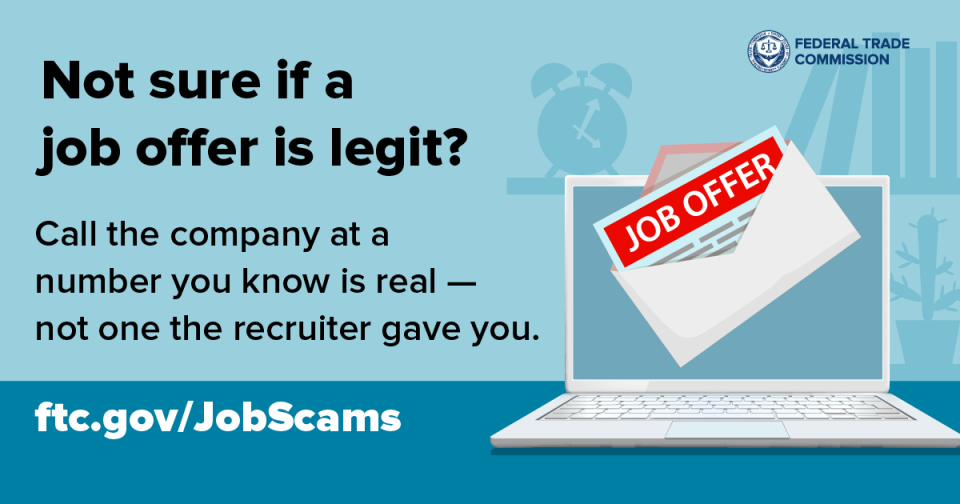Scams can be hard to spot because they often look just like the real thing. That includes job scams. They crop up on real job sites, including places like LinkedIn. Scammers have even invited people to do things like 45-minute interviews, putting in the time so you let your guard down. So how do you tell a scam from the real thing?
Let’s say you get a message from a recruiter. They say you’re just what they’ve been looking for and schedule a virtual interview. The invitation has the company’s logo and an official-looking job briefing guide describing the job’s duties. Soon after the interview, you get the email: You got the job! The offer letter comes in — company logo and all — and everything seems promising. But what comes next?
Here are some signs that job offer may be a scam:
- Scammy recruiters will email you from a personal email, not a company account. Recruiters will generally email from their company (@companyname.com), not a personal email like @gmail.com or @yahoo.com.
- Scammy recruiters push you for money. They might send you a fake invoice for equipment (like a computer ) or “training” that they’ll supposedly order but tell you to pay for first — using mobile payment apps like Cash App, Zelle, or PayPal. They’ll promise to reimburse you…but won’t, because it’s a scam.
- Scammy recruiters ask for your personal information up front. Before giving you any details about the job, they’ll ask for your driver’s license, Social Security, or bank account number to fill out “employment paperwork.” But if you share it, they might steal your identity.
Not sure if you’re dealing with a job scam? Contact the company using a phone number or website you know to be legitimate — not one you got from the “recruiter.”
Report job scams to the FTC: ReportFraud.ftc.gov.
Stay tuned later this month for more on job scams and how to avoid them.


This is very helpful. Thank you!
Be careful at the pump again, the scammers have started to put those scammers on the gas pumps once again. I have been scammed 2x's in the month of November this year.when I got my second debit card I didn't use it 2days after I got. The day I used it was the 20th that morning at 6:30am at Walmart,then I stopped by speedway to get 20.00 of gas by the time 1:00 came I was getting a call from my bank asking about some changes that I had not made 125.48. all over the place. Tampa,St.Pete,and cape Coral. Just that fast. So folks don't use the pump to pay go inside to pay
Thank you for that very helpful info! I’m job hunting now, so I’m sure that will come in handy.
These are very helpful to we in our later years. Thank you for this service; much appreciated.
Thanks for your important message about people’s rights and safety. I have been also facing such issues. I have also complained about this. They are also contacting me. I am just contacting them to see you that their email address is until live. They are International Bank and Organization emails and names. Thanks again for your help.
Thank you.
Thank you!!!
USE PHONE TAP TO PAY. IF THEY DON'T HAVE IT, MOVE ON TO A PUMP THAT HAS IT. SAFEST WAY TO GO NOW. THANKS FTC FOR YOUR WORK.
Advise consumers if a check is mailed to them, have the bank run it through their fraud dept. to determine if legitimate. My bank saved me from being a victim.